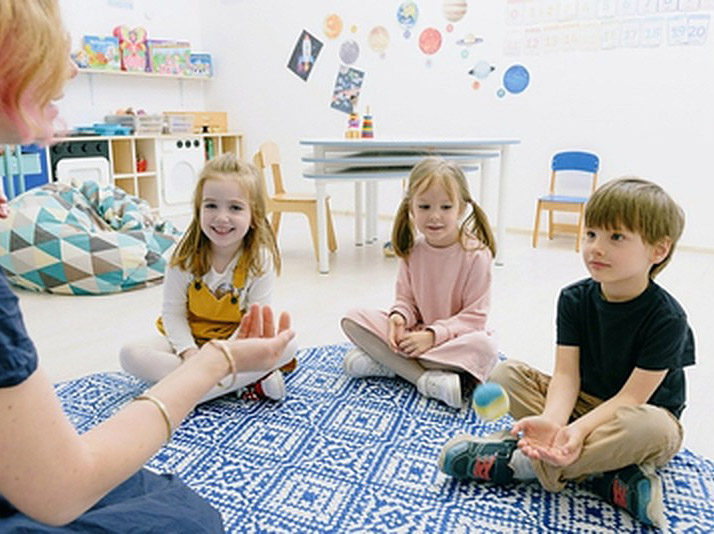
When you imagine the role of a teacher, what comes to mind? Perhaps you think of lesson planning, classroom management, instructing intricate math lessons, and scoring vocabulary quizzes. The role of a Montessori teacher is unlike the traditional ideas we have of instructors and is more like a gentle guide.
Dr. Maria Montessori said the greatest indication of a successful teacher is their ability to say, “The children are now working as if I did not exist.” In a Montessori program, teachers do not believe it is their job to lecture and deliver information to their students.
Instead, Montessori instructors guide children in the general direction of growth and provide them with the tools children need to find the knowledge themselves. An impactful Montessori teacher is a lifelong learner who seeks to instill their love for learning in their students.
So, what is the role of the Montessori teacher within the classroom, and how does this benefit your child on their learning journey?
Creating
A Montessori teacher is a creator. In their classroom, the Montessori teacher carefully prepares an environment fit for exploration with materials and activities that satisfy their students’ interests, developmental needs, and academic levels. A Montessori teacher dedicates much effort and time to building systems and structures that allow students to be self-reliant and have confidence in themselves as learners.
More than creating a comfortable environment, the Montessori teacher is tasked with creating a model of how students should navigate their classroom and, in turn, their world. By establishing a connection with students and building relationships with them based on trust, the Montessori teacher acts as a standard of what kind of behavior makes for a well-rounded member of society. Montessori educators take pride in setting an excellent example for students and instilling good values like accountability, honesty, tolerance, kindness, and respect.
Through their efforts to display positive behavior and attitudes and create an inviting classroom setting, the teacher teaches values such as compassion, empathy, and acceptance to their students. In this way, Montessori teachers follow Dr. Maria Montessori’s philosophy of educating the whole child, promoting collaborative activities that foster teamwork, responsibility, self-discipline, and respect in the classroom.
Maintaining
Once the environment for holistic learning is created, it must be kept. The Montessori teacher’s job is to maintain a safe, clean, engaging, and stimulating classroom where all students feel comfortable, safe, and valued. With students who are exploring their education as individuals, the environment is constantly changing, and it is the Montessori teacher’s role to notice the new and evolving needs of the students.
After intentionally preparing a developmentally appropriate classroom environment, the Montessori teacher invites children to provide feedback on what would make the classroom operate better, supporting them on their journey to work independently and develop autonomy.
Furthermore, the Montessori teacher ensures that the classroom supplies and equipment are available and in working condition, allowing students to investigate their interests and engage with their surroundings in an environment that is prepared for them to do so.
Observing
In a Montessori classroom, the teacher is always aware of each student’s progress and skill level as they work toward mastering important concepts and talents. This is because Montessori teachers don’t rely on standardized tests to gauge their students’ understanding. Instead, they rely on the power of observation.
The Montessori teacher is constantly watching students’ progress and knows when to step in to offer guidance, when to allow the student to work independently, and when to challenge a learner with the next stage in their learning sequence.
The role of the Montessori teacher is not to lecture, but rather to guide. They spend much of class time sitting with students trying to determine what they know about their content areas and what they must work on further. Montessori teachers have pages upon pages of observations, detailing what their students have mastered, what they need more support with, and what they are curious to learn more about.
Guiding and Supervising
Above all, the Montessori philosophy values autonomy, self-reliance, and intrinsic motivation in its students. Students in Montessori classrooms are provided with a variety of learning options and avenues to take in their educational journey, as the Montessori method is based on the idea of freedom within limits.
The Montessori teacher’s role in the classroom is to craft and preserve those limits. Many students, especially those transitioning from traditional education, depend on having a certain degree of structure in their learning environment. The structure can provide young learners with comfort and a safe place in which they feel secure taking risks and attempting new skills.
Montessori teachers help students feel more secure in their classrooms by setting boundaries and guiding students to navigate within those boundaries. In the classroom, this can look like open discussions about time management skills or helping students with prioritizing tasks. When students are struggling to stay focused, Montessori teachers will often endeavor to find a way to incorporate the student’s interests into less desirable work.
The Montessori teacher’s role in the classroom is to give students freedom, confidence to decide, and assistance. In this way, the Montessori teacher is fundamental in helping students to find their way to success in this environment and later in their life.
The Montessori Charter School of Flagstaff was the first school in Arizona to have its application for a charter approved by the Arizona State Board for Charter Schools. We offer an academic program that identifies and encourages each child’s individual social and emotional development. Visit our blog to learn more about our method or reach out today to begin your journey with The Montessori Charter School of Flagstaff.
